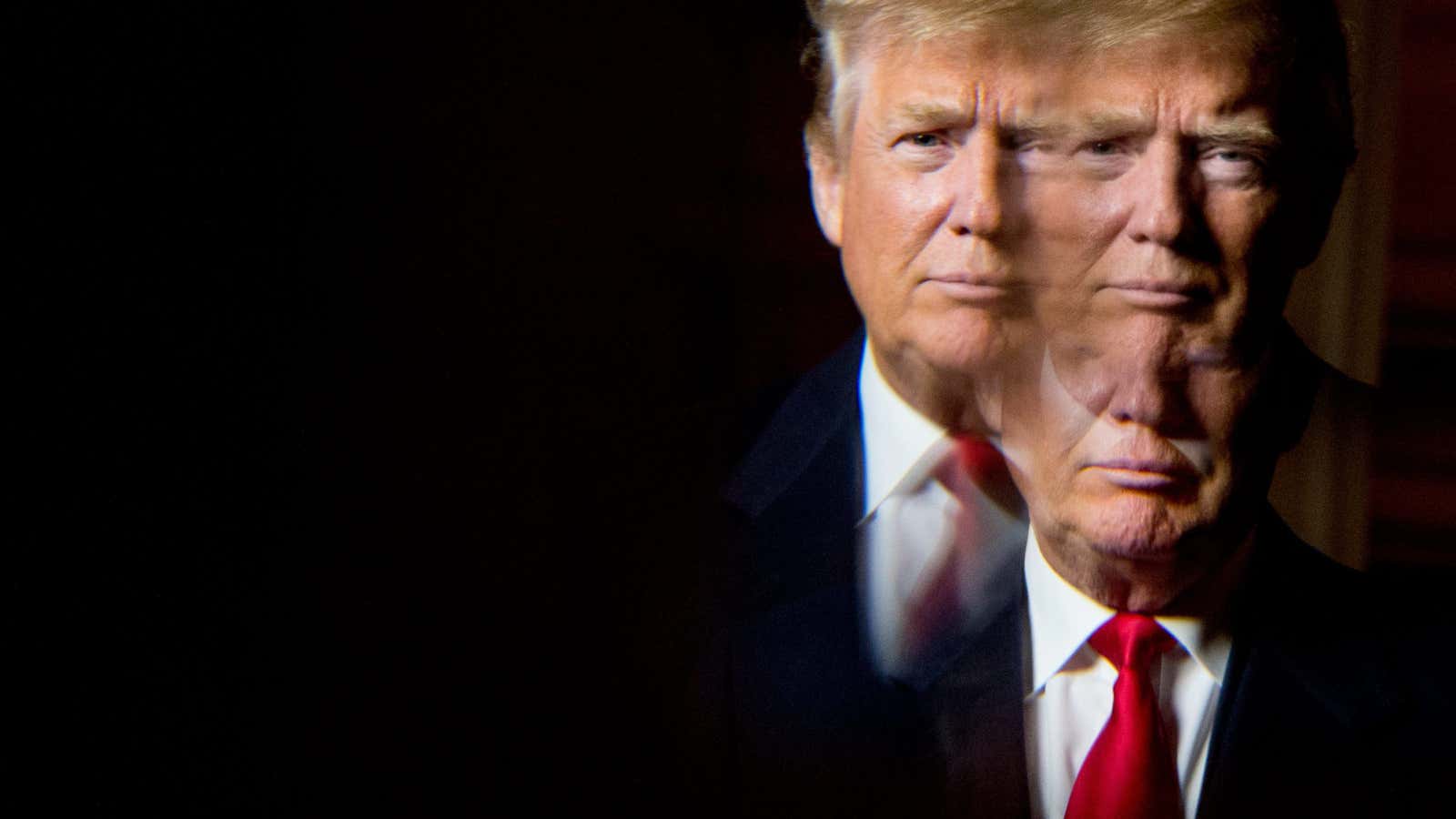A half century ago, Thomas Kuhn invented the term “paradigm shift.” It described a wholesale change in an arm of science—in its very definition, the fundamental concepts underlying it, and the rules of the road in studying it. Evolution and relativity are examples. In terms of technology, the iPhone qualifies.
But like a great ditty, Kuhn’s unforgettable phrase, slung around promiscuously in recent years to describe even the mildest advance in technology and even personal behavior, has seemed to lose much of its punch.
Yet there seems little doubt that now is a Kuhnian moment: The anti-elite uprisings all around us appear to signal the close of one era, and the advent of a new, unknown one. The wave of anti-elitism appears likely to be the most powerful driving force in geopolitical and financial events this year and probably beyond.
In other words, we are experiencing a paradigm shift.
But we are in a void at the moment—the dangerous period before a new age fully takes hold, and systems, nations and movements are up for grabs. What will happen during this interregnum is the subject of this year’s Quartz geopolitical forecasts. To produce our map of how the year seems likely to shape up, we rely on a set of sensible guidelines—these rules of geopolitics, and this added one—that reflect how people over time have tended to behave.
There seems to be no place of significance that will go untouched by the new circumstances.
A new triangle of instability will arise
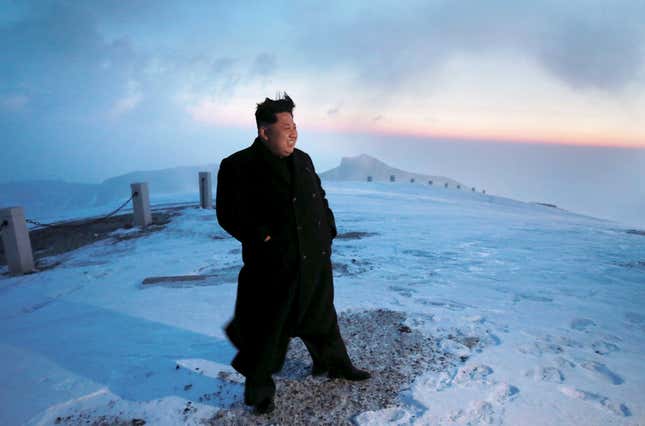
A grand theme for 2017 will be the emergence of three particular points of instability. They are the US, Russia and North Korea, all three of them wild cards, all led by men whose power emanates from a willingness to violate norms and be unpredictable, all seemingly gleeful to surprise and shock. We are calling them a triangle of instability.
They fall under the Big Personality Rule, which explains the impact of individuals whose idiosyncrasies can move and dominate events. But they have different temperaments, and thus the details diverge from here.
Kim Jong Un: On Jan. 1, North Korea’s leader said the country is in final preparations to test an intercontinental ballistic missile. Such a missile, if so aimed, could strike the United States, and, if the North Koreans have figured out the complex engineering, be tipped with a nuclear warhead. This led president-elect Donald Trump to tweet, “It won’t happen.” It’s true that Kim is fond of bold boasts, but experts say tests done to date suggest this one is plausible. The thing to remember about Kim is that he is totally untethered, with no real allies save his support base in China, and no price to pay for bad behavior. So look for him to conduct the ICBM test this year if he possibly can, putting Trump into a crisis.
Donald Trump: Who would have thought 25 years ago that the post-Soviet period would end with Russia—supine at the time and the loser of the Cold War—a primary winner of the aftermath? But that is where we are. On Jan. 15, the US president-elect went on a rant against America’s closest allies, calling NATO obsolete, praising the UK for leaving the European Union, and expressing uncertainty that he will get along with German chancellor Angela Merkel. Meanwhile, Trump said he’s prepared to lift sanctions against Russia—the leading traditional US rival—given accord on the frictionless issues of reducing terrorism and nuclear stockpiles. Trump is also showing every sign of heading for a showdown with China (see below). On top of that is his threat to tear up existing trade deals, including NAFTA.
By consensus of private strategists, Trump’s posture, his bravado and bluster—and his plans to turn the US into a go-it-alone nation, not the world’s leader—make him the greatest geopolitical threat of 2017. Certainly, he is the hub of the triangle of instability.
Vladimir Putin: Over the last three years, Putin has invaded Ukraine, revived Syria’s Bashar al-Assad, and meddled with the US election. What unpredicted antic is next for Putin? We don’t know, and, given his tactical, reactive style of leadership, he might not, either. Certainly, he will lay still and low, lulling Trump into the first East-West alliance, if ill-defined, since World War II. After that, though, Putin will be unable to contain his mischievous nature, and will find a way to test Trump’s mettle. For starters, there are always the national elections in France, Germany, and the Netherlands to hack.
Trump will move hard on immigration and trade
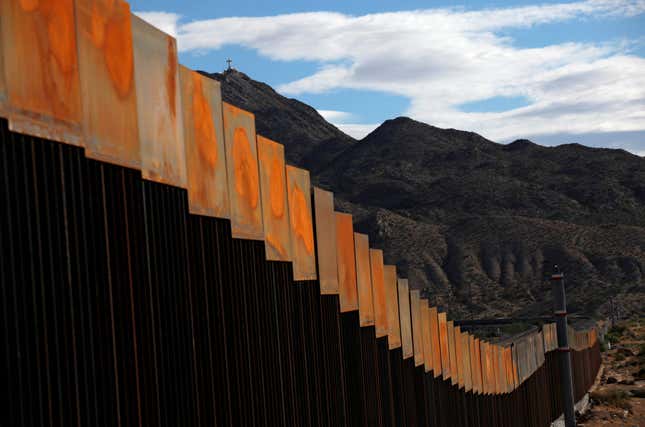
Masha Gessen, the Russian writer, has devised an interesting set of rules for observing (she actually said “surviving”) the Trump administration. After a decade and a half of watching Putin, she said that Rule No. 1 is to “believe the autocrat.” That is, it’s often the case in the rise of an extremist leader to swat away his or her most radical positions, and presume they are mere posturing. History shows that that is almost certainly a mistake. It’s true that some vows end up vanishing. But often, they don’t.
Of all the positions that Trump advanced in his 18-month campaign, his crackdown on Mexicans, Chinese and Muslims were the most central. The first, he asserted, were stealing American jobs by exploiting a badly drafted trade treaty, not to mention raping and murdering peaceful Americans. The second similarly had run roughshod over credulous Americans, again stealing jobs through lopsided trade. The last were an existential danger. We believe that Trump will follow through aggressively on all three, if for no other reason than that if he doesn’t, he will risk alienating his aroused base of supporters. As his recent rhetoric suggests, look for Trump to move fast to single out Muslim visitors and immigrants to the US, round up illegal Mexican immigrants (and erect his wall on the US border with Mexico), and push China hard on trade with threats of big tariffs.
One dynamic governing his actions will be the True Believer Rule. This rule explains the high-conviction behavior of ideologically driven leaders. In Trump’s case, one challenge has been to pin down his actual principles, since they were fungible during the campaign. But even if he himself is not a True Believer, he persuaded his voters that he is, and he must thus answer their sense of grievance at the perceived hand of trade and immigration in their misery and ire. The second rule in play here is the Rule of Injustice, which explains what can happen when a mass of people believe they are the object of unfairness in a way that affects their lifestyle and their children’s future–they can rise up in protest, and bring down governments. This feeling of injustice is a primary emotive power of Trump’s base of support.
There will be a backlash against Silicon Valley
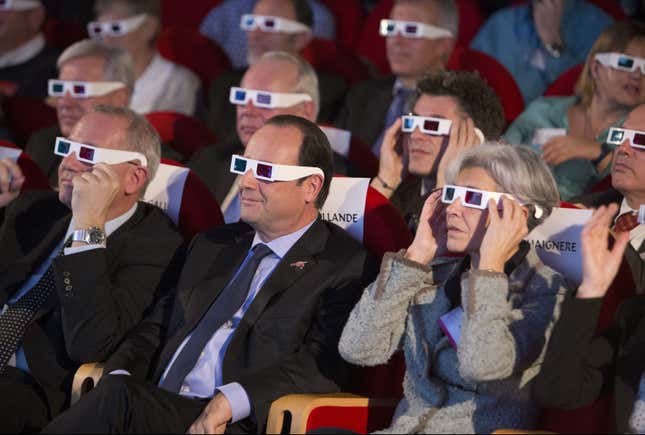
Bubbling beneath the surface of the anti-elite wave is the reality that it is not migrants or trade that are primarily to blame for the feeling of lostness and the degradation of incomes. Instead, it is technology—fast-coming advances in robotics, manufacturing and machine-learning—that is eroding and wholly stripping away well-paying jobs. A lot of experts think worse is coming.
It is only a matter of time before it dawns on millions of Americans—particularly the chunk that has already been whipped into a frenzy by Brexit and Trump’s appeal to their reduced circumstances—that the iPhones they love so much are a substantial source of their current unhappiness. And they are likely to turn their anger at high-tech companies for inventing and commercializing too much, too fast. The most visible target will be Silicon Valley and places like it.
There is no telling how precisely these modern-day Luddites will express their anger. But look for the backlash to materialize in the form of demonization, protests at tech offices, and demands of politicians that something be done: should Silicon Valley be forced to slow down robotization? Should robots made abroad be stopped at the border of the injured nation? Will the backlash go truly global?
These outbreaks of protest will flow from one primary rule—the Injustice Rule, with masses of people feeling seriously aggrieved at headlong technologization that recklessly takes no heed of all its potential impacts.
China and the US will swap roles …
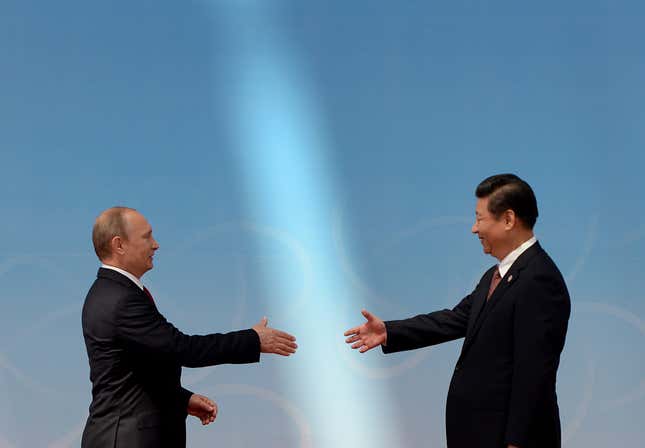
While Donald Trump is focused on doing China one better, Chinese leader Xi Jinping will be looking at the big prize—leadership of a new world order. The first sign of this will be at the World Economic Forum, the annual gathering of the world’s elite being held this week in the Swiss mountain resort of Davos. Since the US no longer wishes to call the shots in a global order, as Trump makes clear, Xi will suggest in a speech today that China is more than happy to. Of course, the new order would go by Chinese rules—democracy will be only one more system of government and not the goal of all nations, as the US-led order has asserted until now. But he would champion free-ish trade and more or less open borders.
There are reasons to doubt that China has the wherewithal to replace the US as the guarantor of stable and prosperous global trade. But look for Xi to seize that mantle and make the case that he can.
… and we will see brinksmanship in the South China Sea
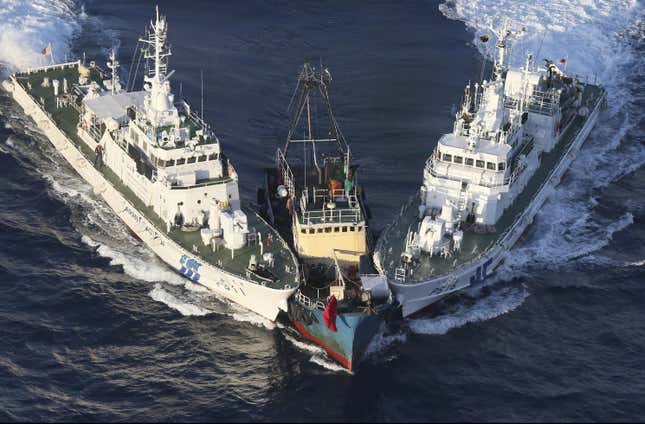
In his Senate confirmation hearings, Rex Tillerson, Trump’s secretary-of-state designate, said that, under Trump, China will lose access to the artificial islands it has built in the South China Sea. Chinese state organs have responded that Trump can try that—at the risk of war.
One rule at play here is the Mountain Rule, which explains the inordinate aggression of a certain set of countries that, because of their military power, or their cultural or imperial past, see themselves as deserving of outsized privilege. Both the US and China behave like mountains. In pushing on the issue of the South China Sea, Trump is inciting Beijing’s sensitivities about its rights in its own backyard. Both Trump and Xi Jinping are also Big Personalities—they see themselves as nationalists writ large, and hence instinctively push their weight around.
But the primary subtextual dynamic is the Rule of Miscalculation. Typically in the game of brinksmanship, the players are rational and acting with the inner-knowledge that someone will pull back before there is actual disaster. But sometimes things go too far, and one or more of the players feel they cannot turn back (such as the world powers in the run-up to World War I in August 1914), and that whatever discomfort transpires will not be all that bad. Such is the danger in the hot talk between Trump and the Chinese.
Look for the South China Sea to be a principal flashpoint of the Trump presidency
Putin will use Snowden as a bargaining chip
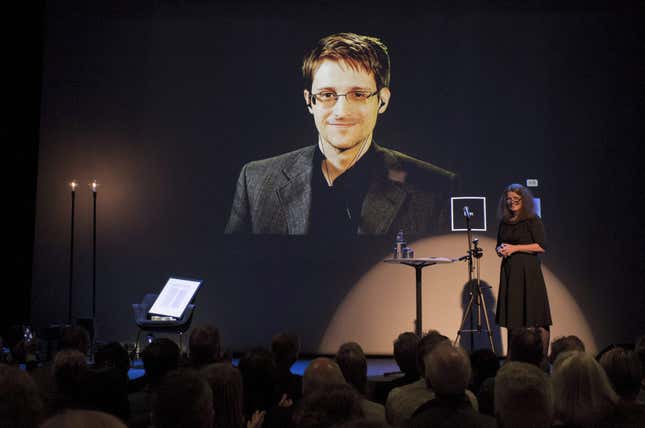
Trump probably doesn’t care about Edward Snowden, the rebel former contractor for the US National Security Agency who in 2013 fled to Hong Kong with some of America’s top secrets, leaked them to the media, then took refuge in Moscow. On the other hand, for a large audience it would be quite a feather in Trump’s cap if he brought home Snowden in chains (figuratively speaking).
Putin knows this. He has gotten much of what he wanted from Snowden. Thus, he will dangle him as an added shiny object in exchange for high-value concessions from Trump—that he is prepared to hand over Snowden, given certain conditions. Putin will assume that Trump will already be prepared to cede recognition of Russian sovereignty over Crimea, and to lift sanctions that the US imposed after Russia invaded Ukraine in 2014. What Putin will be looking for is iron-clad evidence that Trump will treat Russia as an equal player on the world stage, a stature it lost in the Soviet collapse. The main rule at play here is the Rule of Big Personality—when you are so large, you play big.
If Snowden is handed over, it is likely to happen this year because Putin will want the reward—a revival of Russia’s place on the world stage—before he runs for re-election in 2018. So look for Snowden to arrive back in the US.
